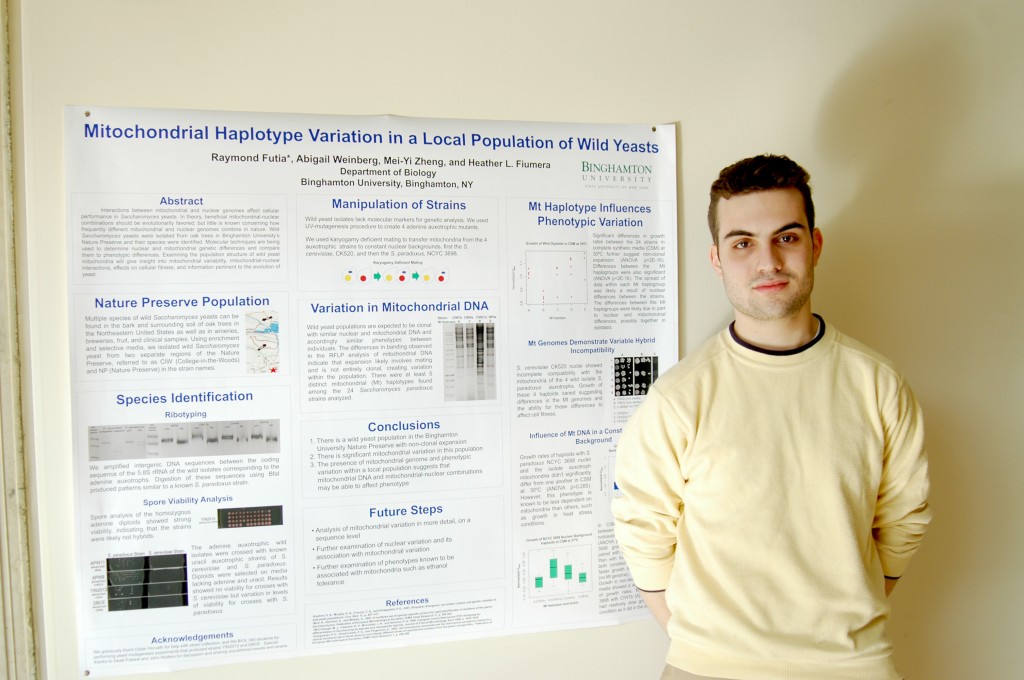
For one Binghamton University student, a trip to the Nature Preserve doesn’t mean watching the sunset on the bridge — it means collecting yeast.
Ray Futia, a junior majoring in biology whose work is being featured at Research Days, is studying how mitochondrial variation affects cell fitness in a natural population.
“A major component of the cell is the mitochondria,” Futia explained. “It’s responsible for energy regulation in the cell. So therefore, it is responsible for overall cell well-being.”
According to Futia, he is using yeast as a model organism because it is very easy to work with. However, he explained that his research is unique in that he is not using lab strains of yeast.
“What I’m doing that’s different from what a lot of other people do is that I’m using yeast from the wild, from oak trees in the Nature Preserve,” he said.
Futia took the samples and isolated the mitochondria from the yeast, looking at the DNA to find variations. He then looked to see what effects the variations had on qualities like how fast the yeast grows.
He said that his ultimate goal is to be able to share his findings with the scientific community.
“I hope to get a conclusive idea with certain statistical tests that says, ‘Yeah, there is variation and it is associated to this in the cells,’” he said. “And when I get to that point, I’m going to try and publish.”
Futia explained that he first became involved in research when he was a sophomore at Bethlehem Central High School.
“I was in this science research course in 10th grade, and that just kind of involved research methods and had some hands-on stuff. Then the summer after my sophomore year, I worked in a stem cell lab, just shadowing people. It gave me a lot of insight, and I got to see a lot of stuff,” he said.
Futia said that he was drawn to Binghamton University due to its affordability as a SUNY school and because of its reputation as being a big research hub.
However, he did not get involved in research at BU until he took the class Genes and Heredity with Heather Fiumera, an assistant professor of biology.
Fiumera said that she first became aware of him after noticing the types of questions he was asking in class.
“You could see him making connections between what he was learning in genetics and other classes,” she said. “The questions that he asked in class clearly were more than what was going to be on the test. The questions were research-oriented. They were asking how he could apply what he was learning to certain situations.”
However, she wasn’t spurred into action until she tuned in to one of Futia’s broadcasts on WHRW 90.5 FM, BU’s student-run radio station.
“He was highlighting a piece of genetics that had been in the popular press, sharing the information that he had read in an article,” she said. “And that was the turning point for me where I just said, ‘All right, this guy needs to work in a lab.’”
Fiumera said that Futia is a remarkably quick learner.
“I worked with Ray, initially, very closely,” she said. “But very quickly he proved that he could be completely independent.”
Fiumera said that she sees Futia as more of a colleague in the lab than as an undergraduate researcher, and that she believes he will be a strong contributor to science.
“I feel very fortunate to be able to work with Ray at this early stage of his scientific career,” she said. “I think this is a name that you will see in the future as an independent researcher.”
According to Futia, he would like to pursue research as a career, preferably in an academic setting.
“Research in general is something that I love; that’s why I do it,” he said. “I love exploring and learning and learning new stuff.”


